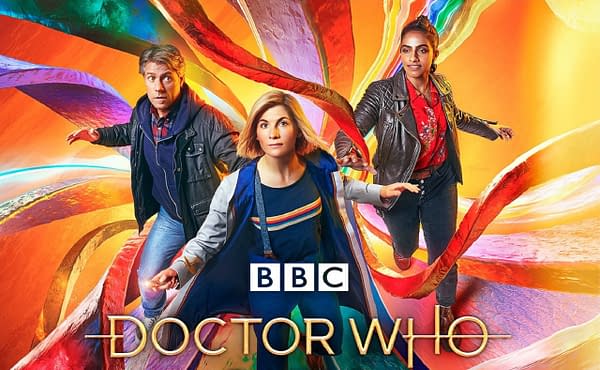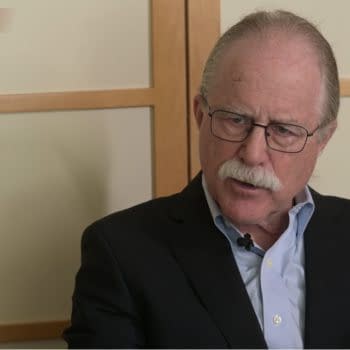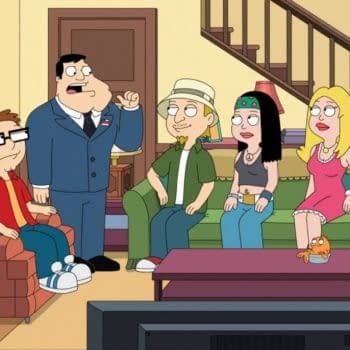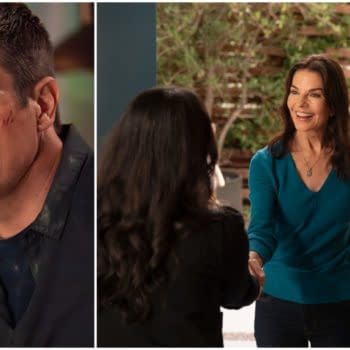Posted in: BBC, Doctor Who, TV | Tagged: bbc, Brexit, chris chibnall, doctor who, jodie whittaker, russell t davies, steven moffat, Tharries
Doctor Who: Here's What's REALLY Wrong with Chris Chibnall's Run
It's pretty much agreed amongst fans that Doctor Who under Chris Chibnall's tenure as showrunner has not been anywhere as good as his predecessors Russell T. Davies and Steven Moffat. Not many people have been able to put their finger on exactly what was wrong. Sexists, racists, and homophobes have blamed it on the casting of Jodie Whittaker as a female Doctor, more characters of colour in the main cast, more LGBTQ characters, and too much "woke". We would argue that the problem with the show is that it's not "woke" enough. In fact, it's a lot less "woke" than it was under Davies and Moffat, and that's the problem all along. It really should be more "woke".

The problem with Chibnall's Doctor Who is that he transformed the Doctor into a Conservative. This had been on our minds for quite a while but it was fan video commentator Tharries who beat us to pointing it out on his YouTube channel. He deserves the credit for being the first to say all this out loud.
The Moral Failures of the 13th Doctor
Tharries points out that Chibnall's Doctor was one who defeated individual bad apples but left horrible political, social, and economic systems in place to carry on getting away with the terrible things they do. In "Rosa", the Doctor defeats a racist from the future by stopping Rosa Parks from being discriminated against to prevent the American Civil Rights movement from taking off, rather than attacking the actual fabric of racism that permeated American society at the time. The worst example is in "Kerblam" where the Doctor goes after an activist-turned-terrorist out to bomb the customers of an Amazon-like business because it treats its employees like crap. It's a common neoliberal, pro-capitalist tactic to paint activists and protesters as murderous terrorists in order to render their valid arguments against Capitalist practices invalid. The same tactic was used to smear the Occupy Wall Street protesters in Christopher Nolan's The Dark Knight Rises back in 2012. Meanwhile, the Doctor leaves the AI running the business intact even after it murdered at least one innocent employee to punish the protester. In the past, the Doctor would have wiped out the computer system for committing murder. This was one of the worst moral failures the Doctor has ever committed in the history of the show. At the very least, she should have cancelled her Amazon – sorry, Kerblam account. But she didn't even do that.
In "Orphan 55", a seemingly typical episode that pushes an environmentalist message, the Doctors calls on individuals to prevent a catastrophic future without ever calling out the governments and corporations that cause the greatest environmental problems. Again, the Doctor puts the responsibility on individuals who don't have as much power as the system that the Doctor tacitly supports by leaving them standing. Tharries says as much in his video.
This carries over into "Flux", Chibnall's worst season, the worst-written, mired in sloppy, lazy writing where long speeches full of gobbledygook exposition showed all the weak points of the show and Chibnall's writing on a technical level. However, the moral laziness persisted in the Doctor's failure to question the brutal system she was working for as a part of, even though she ran from it in the past rather than openly oppose it or bring it down. She does nothing to refute or oppose Tecteun, the adopted mother who exploited and abused her. The undoing of the destruction of the universe feels weak and incomplete by the end. Incomplete and unsatisfying defines Chibnall's era of Doctor Who.
A Doctor for the Brexit Era is Miserable
The Doctor of past eras was always an anti-establishment figure, contemptuous of authority who believed trust had to be earned. They frequently brought down entire regimes and governments for being unfair and exploitative. The monsters and killer robots of those stories were usually extensions of the regimes' evil, so they defeated them and then the whole regime. That has always been the central appeal of the Doctor: the hero who brought change. Chibnall's Doctor did not bring change at all but maintained the awful status quo. This Doctor is oddly passive, doing only the minimal, saving the world but leaving its badness in place.
You could say this is a Doctor for the Brexit era: morally lazy, tired, passive, doing the minimum to keep up appearances. It's unfortunate that Chibnall turned Jodie Whittaker into the embodiment of that. Disappointed and angry fans detected that but ended up blaming her for the show's failings.
It's not Whittaker's fault. She can only be as good as the scripts she's given. She tried to play the Doctor she was meant to be, a joyous, irreverent, maternal Northerner given to extravagant fun. She's most similar to Peter Davison's Doctor in that she wasn't an authority figure, less given to suddenly commanding a room through sheer force of will like every other Doctor. The problem is, the scripts never let her go far enough, never let her push things over the edge to make her a truly formidable Doctor. Hers became the morally weakest Doctor under Chibnall. This is why there's so much hope invested in the return of Russell T. Davies as showrunner, the hope that he would bring back the moral authority of the Doctor, a Doctor who's willing to destroy entire corrupt governments, corporations, systems so that something better can replace it.














